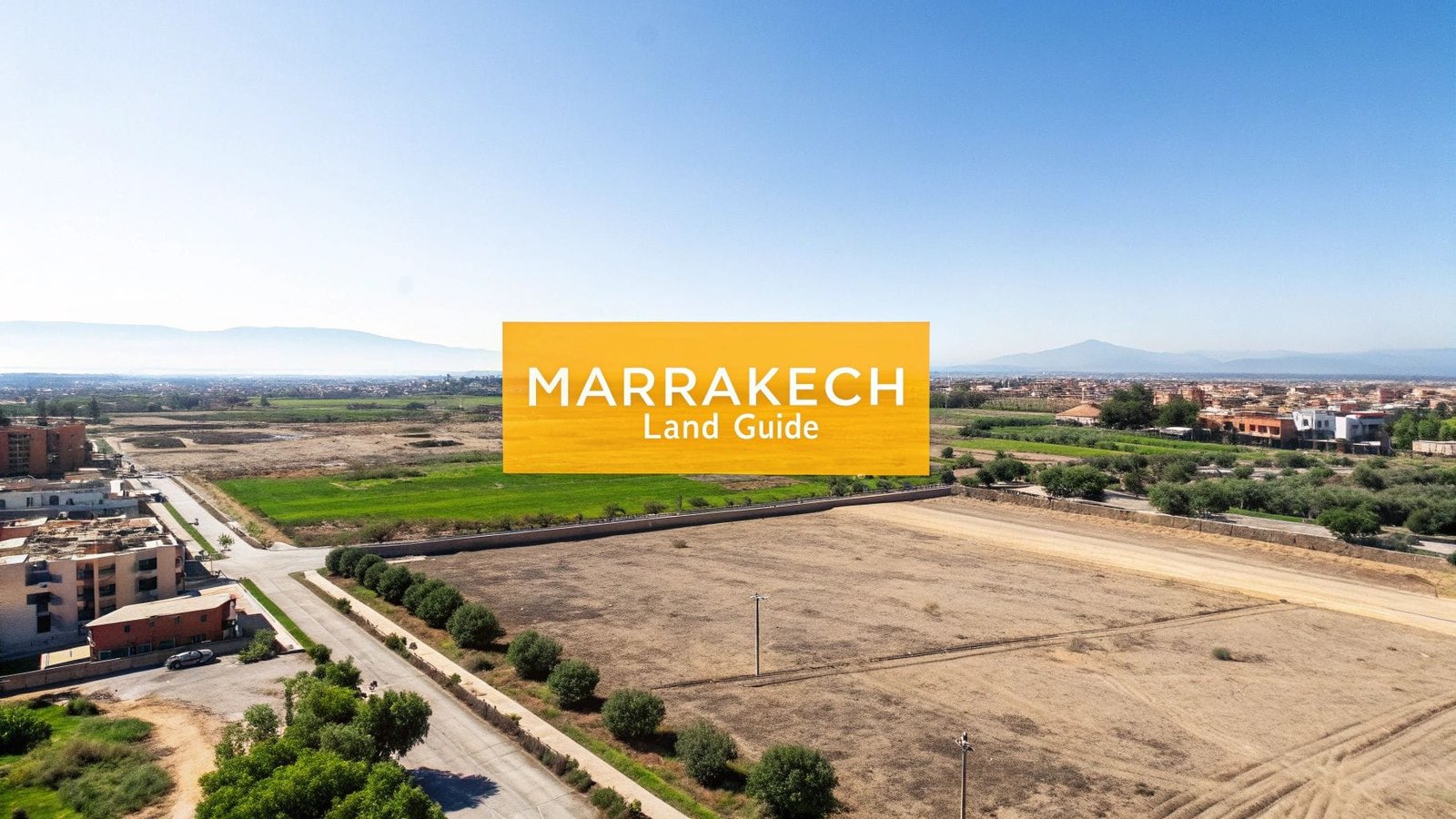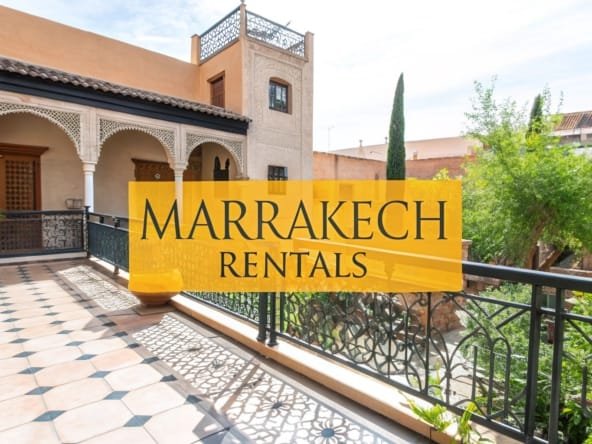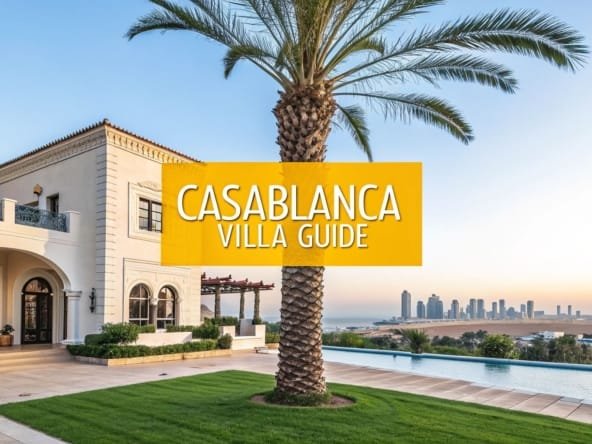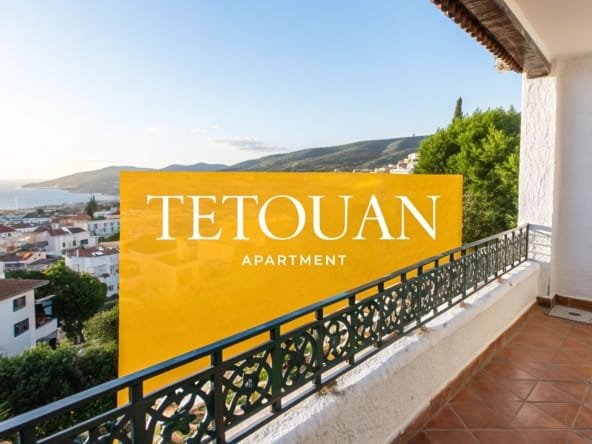When you search for a terrain à vendre à Marrakech particulier, you're not just looking for land; you're looking for a direct path to your investment. This approach cuts out the middleman, putting you face-to-face with the owner and opening up a world of negotiation, savings, and customisation.
The Unique Appeal of Private Land Sales in Marrakech
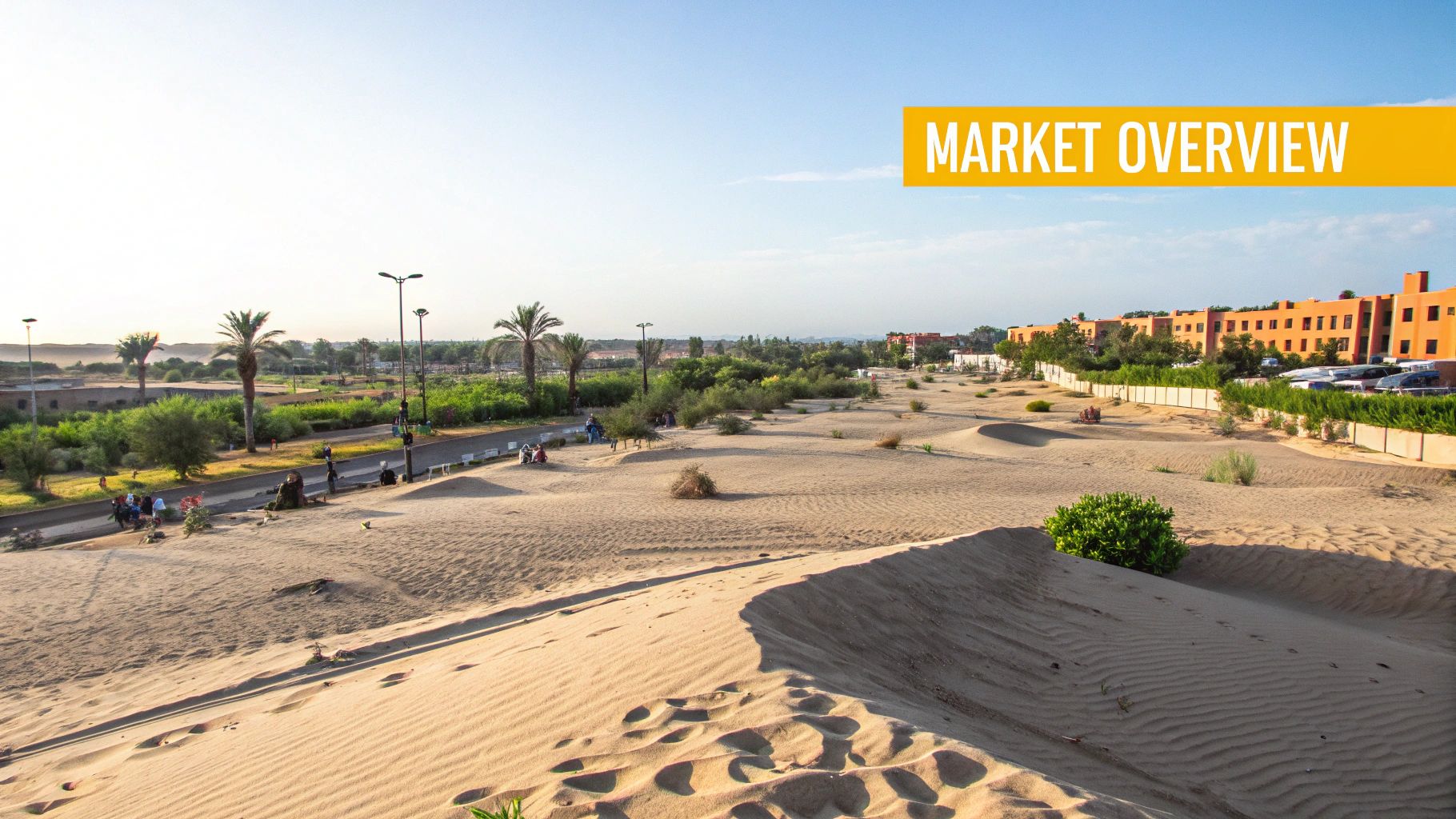
Diving into the Marrakech property market to buy land directly from an individual owner offers a distinct set of benefits. Unlike the usual real estate deals crowded with agents and intermediaries, a private sale simplifies everything. You get a direct line to the one person who knows the land inside and out: the owner.
This isn't just about convenience—it's a real strategic edge. Having that direct conversation often leads to clearer negotiations and, quite often, a better price. After all, you’re not paying agency commissions, which can take a hefty slice out of any deal.
Why Buyers Are Turning to Private Sales
More and more buyers are opting for private land sales, and it's easy to see why. The biggest draw is usually financial. When you deal directly with the owner, you avoid the standard agency fees, freeing up a significant amount of cash that can be put straight into developing your new plot.
But the appeal goes beyond just saving money. Private sales are your key to unlocking exclusive opportunities. Many of the most unique or sought-after plots in Marrakech never hit the open market. They're sold quietly, through personal connections and private networks. Searching for a terrain à vendre à Marrakech particulier is how you gain access to this hidden inventory.
A private sale is about more than just a transaction. It’s about building a direct relationship with the seller and getting an unfiltered look at the property's history and potential—an advantage you rarely get in a brokered deal.
Starting Your Investment Journey the Right Way
Think of this guide as your personal roadmap. Buying land in Morocco comes with its own set of legal steps and procedures, and getting them right is crucial for a secure investment. If you understand these nuances from the get-go, you can protect your interests and ensure the whole process goes smoothly.
Here are the key things to keep in mind as you begin:
- Finding the perfect plot: Your first step is to locate land that truly fits your vision, whether you're dreaming of a private villa, a rental property, or a commercial venture.
- Getting to know Moroccan property law: You'll need to understand the essentials, like title verification and the central role of the notaire (notary).
- Doing your homework: Thorough due diligence is non-negotiable. This means checking zoning laws and making absolutely sure there are no legal claims or restrictions on the land.
Understanding the Marrakech Real Estate Landscape
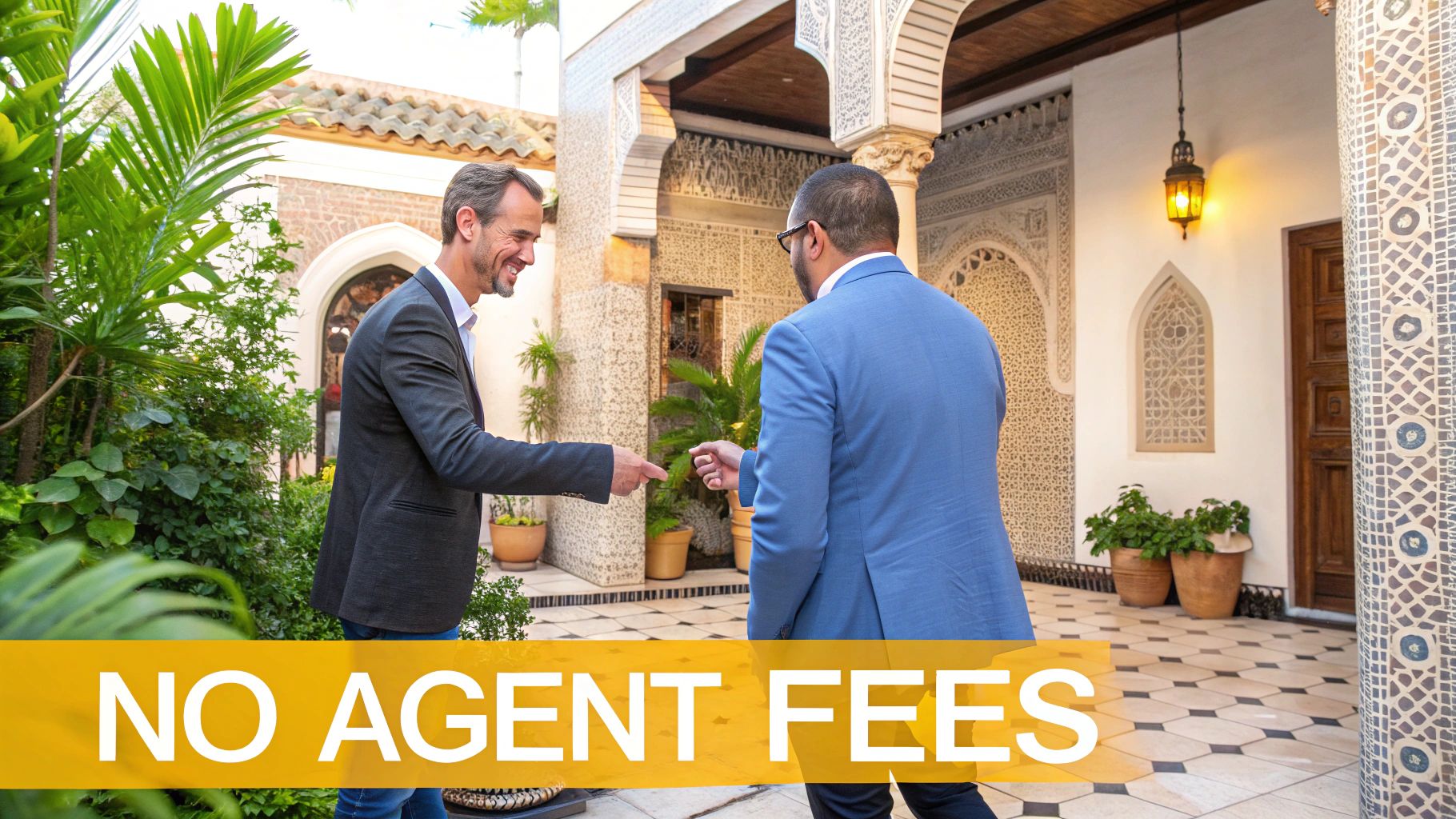
Before you can make a smart move on a terrain à vendre à Marrakech particulier, you need a real feel for the city's unique property market. It’s a genuine tale of two cities coexisting. On one hand, you have the ancient, maze-like Medina; on the other, the slick, modern districts that are constantly expanding. This contrast is precisely what creates such a diverse and exciting range of opportunities for anyone looking to buy.
The historic heart of the market is, of course, the Medina. This UNESCO World Heritage site is where you'll find the iconic riads and dars, properties that radiate cultural authenticity. Investors are often pulled in by this charm, not to mention the rock-solid potential for high-yield tourist rentals. It’s a market built on heritage.
Then you have the flip side: the new neighbourhoods springing up across the city. Places like Targa and the developments stretching out along the Ourika Road are shaping the future of Marrakech. Here, the focus is on contemporary villas, generous plots of land, and all the modern comforts, drawing in everyone from local families to international buyers chasing a different kind of Moroccan dream.
Key Market Drivers and Trends
So, what’s actually pushing land values up in Marrakech? A few powerful forces are at play, and getting to grips with them is key to spotting areas with the best growth potential. Tourism, without a doubt, remains the city’s economic powerhouse, constantly feeding the demand for everything from holiday rentals to plots for new commercial ventures.
Foreign investment is another massive piece of the puzzle. Buyers from Europe, the Middle East, and further afield are consistently drawn to Marrakech for its climate, vibrant culture, and attractive investment environment. This steady international interest brings both stability and a healthy dose of competition to the market. You can dive deeper into the city's unique appeal in our guide to understanding the Marrakech luxury property market.
When you look at the recent data, the market is clearly split. You have the traditionalists hunting for that perfect riad in the Medina, and then you have middle-class families looking for modern homes in areas like Targa. One of the biggest shifts we've seen since the pandemic is a strong preference for larger properties with gardens and pools. There’s also a growing appetite for sustainable, eco-friendly construction, especially in the luxury sector.
Identifying High-Potential Zones
Finding the right piece of land is about more than just the current asking price; it's about seeing its future potential. Certain clues can tell you if a neighbourhood is on an upward swing.
- Infrastructure Development: Keep a sharp eye out for new roads, schools, or shopping centres. These are often the canaries in the coal mine, signalling that property values are about to climb.
- Proximity to Lifestyle Amenities: Land located near prestigious golf courses, international schools, or popular restaurants will almost always command a premium and appreciate more quickly.
- Zoning and Regulations: It pays to do your homework. Getting a copy of the local 'plan d'aménagement' (the urban plan) will show you exactly what’s planned for the area and what restrictions are in place.
When you start analysing these factors, you shift from simply being a buyer to becoming a strategic investor. The real goal is to find a plot of land that doesn't just work for you today but is perfectly positioned to ride the wave of the city's future growth.
How to Find Off-Market Land Deals
When you’re searching for a terrain à vendre à Marrakech particulier, you have to think differently. The best deals aren't sitting on the big, flashy real estate portals. They're hidden, waiting for someone with the right strategy to uncover them. Finding these plots is an art, blending modern digital hunting with old-school, boots-on-the-ground networking.
Your first port of call should be the local Moroccan online platforms. While it’s tempting to stick to international sites, places like Avito.ma and Mubawab.ma are where private sellers in Morocco are most comfortable listing. Get creative with your search terms in both French and Arabic, and be sure to set up alerts for your preferred neighbourhoods. This is your digital ear to the ground.
Tapping Into Local Networks
But let’s be honest, the real gold is found offline, woven into the fabric of Marrakech’s communities. This is the world of the 'semssars', the informal fixers and brokers who are the lifeblood of the local property scene. They aren't licensed agents, but their connections run deep. A good semssar knows who's thinking of selling long before a "for sale" sign ever goes up.
Building relationships is everything here. Spend time talking to local notaries, chat with café owners, and get to know community leaders. You'd be surprised how often a casual conversation can lead to a tip-off about a family looking to sell a piece of land. This is how you get access to deals that the wider market never even hears about.
The most valuable land deals in Marrakech are often found through conversations, not listings. Engaging with the local community transforms your search from a passive activity into an active hunt for exclusive opportunities.
Don’t underestimate the power of simply driving or walking through the areas you’re interested in. It’s a surprisingly effective technique. Many landowners skip the listings altogether and just hammer a simple sign into the ground with their phone number scrawled on it. This direct method gives you a chance to see the plot for yourself and get in touch immediately.
When you spot a listing or a sign, learn to read between the lines.
- Vague Descriptions: A listing with very little information can be a tell-tale sign of a private seller who isn't working with an agent. They’re often more flexible and open to direct negotiation.
- Photos of Surrounding Area: If the pictures show more of the neighbourhood than the actual plot, it could mean the owner is keen to sell and is trying to show the land's potential.
- Contact Information: A direct mobile number is a dead giveaway you're dealing with the owner, not an agency. This is your green light.
When you make that first call or send that first message, keep it professional and respectful. A simple, clear expression of your serious interest will get you much further than trying to play hardball from the start. A bit of politeness builds trust and sets the right tone for a smooth and rewarding private deal.
Navigating Moroccan Property Law Like a Pro
Buying a terrain à vendre à marrakech particulier successfully comes down to one thing: getting to grips with the local legal process. It’s not overly complicated, but it is meticulous. Think of it less like a sprint and more like a carefully choreographed dance—every step has a purpose and must be done in the right order to guarantee a secure, legally recognised purchase.
At the heart of this entire process is the 'notaire', or notary. This isn't just any lawyer; a notaire is a government-appointed legal professional who acts as a neutral third party. Their job is to oversee the transaction, verify every legal detail, and protect both you and the seller. Bringing a trusted notaire on board from the very beginning is the single most important decision you'll make.
The Key Contractual Stages
The path from a handshake agreement to holding the keys involves two fundamental contracts. The first is the 'compromis de vente', which is the preliminary sales agreement. This is a serious, legally binding document. It locks in the agreed-upon price and any specific conditions of the sale. This is also the point where you'll typically pay a deposit, usually around 10% of the total price, to show your commitment.
This initial contract lays out everything in black and white—from the exact legal description of the land to any "what if" clauses, like the sale being conditional on you securing a loan or confirming you can get planning permission. It effectively presses 'pause' on the sale, giving your notaire the time they need to conduct all the necessary background checks before anything is finalised.
Once all the conditions in the compromis de vente have been met and the notaire gives the green light, you'll move to the final step: the 'acte de vente'. This is the final deed of sale. You sign this document in the notaire's office, pay the remaining balance, and just like that, the ownership officially transfers to you. The notaire then takes care of registering the sale with the land registry, known as the 'Conservation Foncière', making you the undisputed owner.
Essential Due Diligence Checks
Before you even think about transferring the main payment, your notaire will be busy behind the scenes, running several critical checks. These aren't optional extras; they are the foundation of a safe investment.
- Title Deed Verification: First and foremost, the notaire confirms the land has a clean 'titre foncier' (land title). This is the golden document. It proves the seller actually owns the land and confirms there are no hidden mortgages, legal claims, or debts attached to it.
- Zoning Compliance: What are you planning to do with the land? Your notaire will get a 'note de renseignements urbanistiques' from the urban agency. This official document spells out the local zoning regulations ('plan d'aménagement'), telling you exactly what you can and, more importantly, cannot build on that specific plot.
- Tax Clearance: Nobody wants to inherit someone else's debts. The notaire will verify that the seller is completely up-to-date on all their property taxes, ensuring you start with a clean slate.
The legal journey for a private land purchase in Marrakech follows a clear and logical sequence. Each stage builds on the last, ensuring all legal and financial aspects are correctly handled.
The table below breaks down these crucial steps, clarifying who does what and which documents are essential at each point.
Key Stages of a Private Land Purchase in Marrakech
| Stage | Key Action | Primary Professional Involved | Essential Document |
|---|---|---|---|
| Preliminary Agreement | Buyer and seller agree on terms; buyer pays a deposit. | Notaire | 'Compromis de Vente' (Preliminary Sales Agreement) |
| Due Diligence | Verification of title, zoning laws, and tax status. | Notaire | 'Titre Foncier' & 'Note de Renseignements' |
| Finalisation | Signing of the final deed and payment of the remaining balance. | Notaire | 'Acte de Vente' (Final Deed of Sale) |
| Registration | The sale is officially recorded with the government land registry. | Notaire | New 'Titre Foncier' in the buyer's name |
Navigating these stages with a competent notaire ensures your purchase is transparent, secure, and fully compliant with Moroccan law, giving you complete peace of mind.
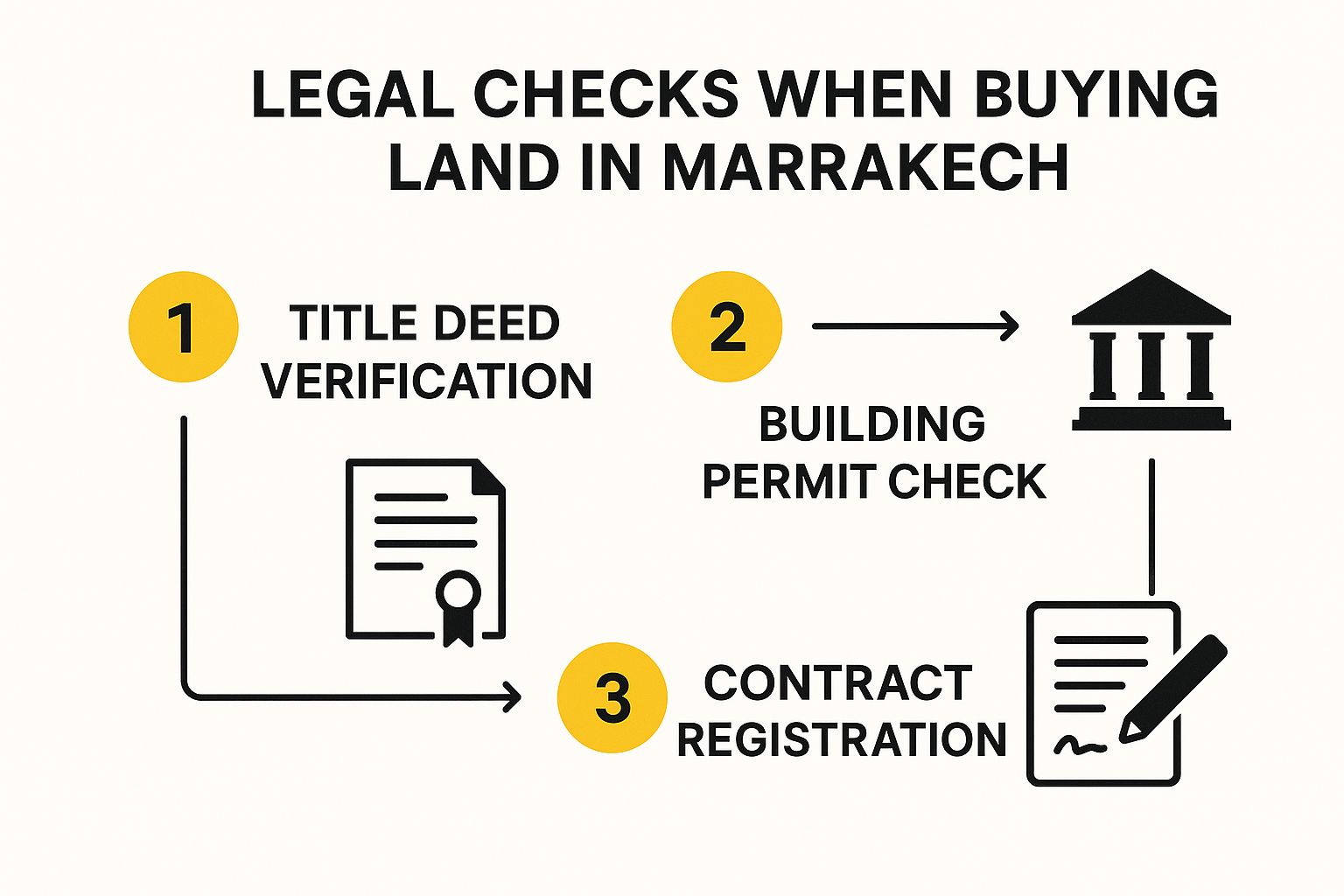
As you can see, the process is designed to be sequential. Each step must be completed successfully before moving to the next, creating a chain of security that protects your investment from start to finish.
The biggest mistake you can make is trying to rush the legal process. Every single step, from the 'compromis de vente' to the final registration, is there for your protection. Lean on your notaire's expertise and trust the system—it’s designed to get you to the finish line safely.
Financial Planning for Your Land Investment
Finding the perfect terrain à vendre à Marrakech particulier is a thrilling moment. But before you get swept away by the possibilities, it's crucial to ground your excitement in a solid financial plan. A successful purchase isn't just about the asking price; it's about understanding the total cost of ownership from day one.
Think of the listed price as the starting point. To avoid any unwelcome surprises, you need to build a complete budget forecast that accounts for all the associated, mandatory costs of a property transaction in Morocco. These aren't optional extras—they are fixed expenses you must factor into your total investment capital right from the start.
Budgeting for All Associated Costs
A truly comprehensive budget will have several key line items beyond the land itself. These are standard fees in any Moroccan property deal, and your notaire (notary) will give you a clear breakdown before you sign anything.
Here’s a look at what you need to plan for:
- Notary Fees (Frais de Notaire): Expect this to be around 1% of the purchase price. This covers the notary's essential work, from due diligence to drafting contracts and officially registering the sale.
- Registration Tax (Droits d'Enregistrement): This is a government tax on the property transfer. For undeveloped land, it's generally calculated at 4% of the sale price.
- Land Registry Fees (Conservation Foncière): To get your name on the official land title (titre foncier), you'll pay a fee of 1.5% of the property value. This makes you the new legal owner.
- Miscellaneous Administrative Costs: It's always wise to set aside a small buffer—usually a few hundred euros—for various administrative stamps, certificates, and other small tasks that pop up.
As a rule of thumb, the total transaction costs in Morocco will typically add up to between 6% and 7% of the property's purchase price. Factoring this into your initial budget is non-negotiable for a smart investment.
Assessing the Market and Investment Potential
Understanding the unique value of Marrakech's property market is what gives investors real confidence. The city offers a rare combination of affordability and strong returns, especially when you stack it up against other international hotspots. This financial edge is precisely why so many are turning their attention here.
If you're looking to make a well-informed move, digging into the top reasons to invest in Marrakech real estate will give you a much clearer picture of the opportunity.
The numbers speak for themselves. As of 2025, the average property price in Marrakech hovers around €1,100 per square metre. Compare that to Lisbon at €3,800/m² or Barcelona at €4,000/m², and you'll see the entry cost is roughly 60-70% lower.
But it's not just about the lower barrier to entry. Marrakech also delivers on returns. Short-term rentals can generate impressive annual yields of 7-9%, while long-term lets bring in a steady 5-6%. This performance easily outpaces the typical 2-5% yields you'd find in major European capitals. This powerful blend of accessible pricing and high potential returns is what makes a private land purchase such a compelling financial venture.
Common Pitfalls in Private Sales and How to Avoid Them
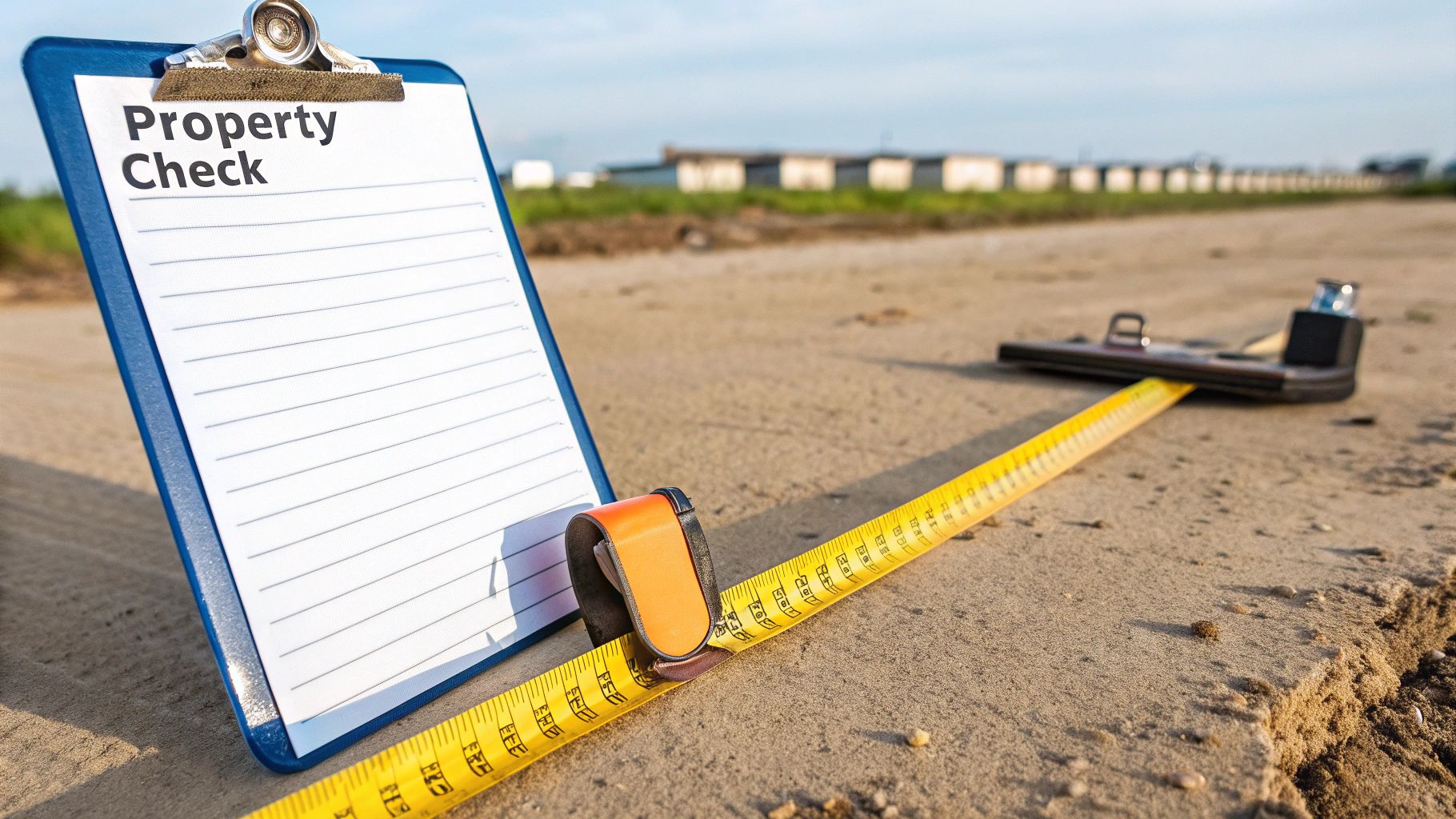
While striking a private deal for a terrain à vendre à Marrakech particulier can feel like a huge win, the path is often lined with hidden risks. What you don't know can quickly turn into a costly mistake. The best way to protect yourself is to know what these common issues are from the start, turning potential disasters into simple items on your checklist.
The Problem of Unclear Titles
One of the biggest dangers you’ll face is a murky or disputed land title. In Morocco, the absolute gold standard is the 'titre foncier'. Think of it as a unique, indisputable title deed officially registered with the national land registry. Without one, you might be buying into a property with a much more complicated ownership structure known as 'melkia'.
A property under 'melkia' ownership often belongs to an entire family, sometimes with dozens of heirs. Getting every single person to sign off on the sale can be a legal nightmare. If just one heir objects, the whole deal can fall apart, leaving your investment stuck. This is precisely why your first request should always be to see a clean 'titre foncier'. To get a better handle on the legal side of things, take a look at the secret to buying property in Marrakech revealed in our in-depth guide.
Zoning and Building Surprises
Another trap is simply assuming you can build your dream project on the land you're buying. Marrakech has very specific zoning laws detailed in its 'plan d'aménagement' (urban development plan). A seller might paint a beautiful picture of what's possible, but the local urban agency always has the final word.
To avoid a crushing disappointment down the line, you need to get an official 'note de renseignements urbanistiques'. This document is your safety net. It will tell you exactly what the land is zoned for—be it residential, commercial, or agricultural—and detail any restrictions, like limits on building height or plot usage.
A seller's verbal promise about building potential is worth absolutely nothing. The official 'note de renseignements' is the only thing that gives you the legal certainty required to move forward with confidence.
Market Realities and Proper Due Diligence
Finally, you can't afford to ignore the realities of the market. Marrakech is a desirable location, but it isn't immune to fluctuations. Recent data shows that while prices may appear to be rising, the market can be volatile. One analysis pointed to a significant 18% drop in sales volume between 2024 and 2025.
Knowing about these trends is crucial. It gives you a stronger position when you negotiate and helps you make a smarter, more informed investment. Proper financial due diligence isn't just a suggestion; it's a necessity for timing your purchase right.
Your Questions About Buying Land in Marrakech, Answered
Thinking about buying a plot of land in Marrakech? It’s a fantastic move, but it’s completely normal to have a few questions swirling around. Let's tackle some of the most common ones we hear from buyers, so you can move forward with confidence.
Can Foreigners Actually Buy Land in Morocco?
Absolutely. The short answer is yes, foreign nationals can legally own land in Morocco. However, there's one crucial detail you need to know.
You are free to purchase land that is zoned for non-agricultural purposes—what’s known as titled land, which comes with a 'titre foncier'. The law, however, prevents foreigners from directly owning agricultural land. Your notaire is your best friend here; they will verify the land's official classification before you even think about signing anything, making sure your plans for the plot are legally sound.
What's the Single Most Important Document I Need?
If there's one thing to remember, it's this: the 'titre foncier', or land title. Think of it as the property's passport. It’s the official, government-backed proof of ownership.
This document is your ultimate protection. It guarantees that the seller is the undisputed owner and that the land is completely clear of any hidden debts, mortgages, or ongoing legal fights.
Our best advice? Stick to properties that have a clean and verified 'titre foncier'. Venturing into a purchase of untitled land, often called 'melkia' property, opens the door to a world of legal headaches and risks that could put your entire investment on the line.
How Much Extra Should I Budget for Closing Costs?
The asking price isn't the final number. A good rule of thumb is to set aside an additional 6% to 7% of the land's value to cover all the closing costs.
This buffer will handle all the necessary fees, including:
- Notary fees
- Registration taxes
- Land registry charges
A trustworthy notaire will give you a clear, itemised breakdown of these costs from the get-go, so there are no surprises when it’s time to finalise the deal.
At Rich Lion Properties, we're here to provide the expert, on-the-ground guidance you need for your property journey in Morocco. Contact us today to find your perfect plot of land in Marrakech.
